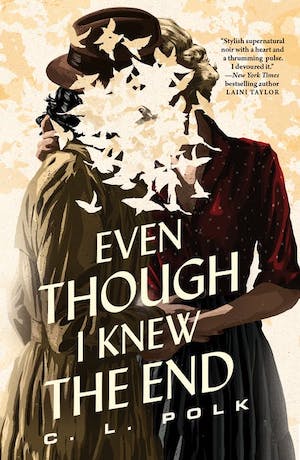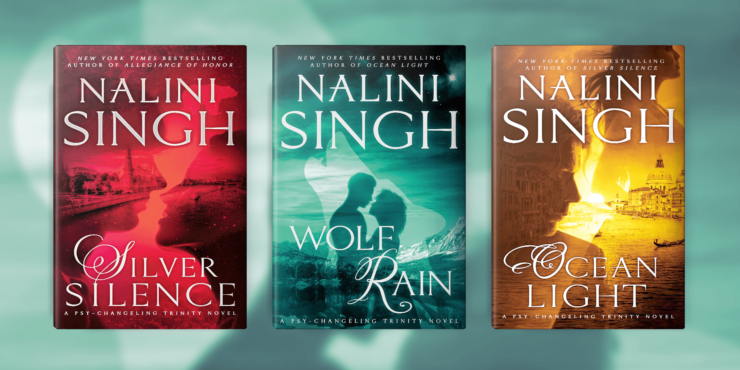Further to my confessions from last time, I have to be transparent that due to time constraints, I did not go back and read the entire Psy-Changeling series before writing this column. On the advice of counsel, I started with Silver Silence, which begins a new chapter in Nalini Singh’s Psy-Changeling world. This sequel series, called the Psy-Changeling Trinity series, consists of six books so far, which made it much easier and more accessible for a newbie Singh reader. (It would have been god-tier to read all 21 novels across both series, though, wouldn’t it? Some real “all shall love me and despair” shit. If we weren’t facing two plagues and a global rise in fascism, I’d totally have done it.)
Trying to recap the series in full would be a fool’s errand, so I’ll do my best to sum it up briefly: Singh’s world includes humans, changelings, and Psy, the latter being people with supernatural mental powers like telekinesis and empathy. Based on what I have been able to deduce from the six books in the Psy-Changeling Trinity series, the Psy once controlled everyone else in an orgy (not the fun kind) of power-mad abuse and machinations. Now, thanks to—I suspect—the power of love and collective action and maybe some actual orgies!, the three sentient species have attained a fragile détente. But the Psy’s very existence is threatened, as the mental network that holds the Psy together and keeps them sane and alive, called PsyNet, has begun to fracture badly.
Ivan Mercant belongs to the powerful, tight-knit Mercant family, but his powers as a Psy are so maliciously evil that he must keep a tight lid on himself at all times to avoid shlurping up the life force of everyone around him. He’s chilly and isolated by necessity until he meets Lei, a changeling woman and a healer who teases him, challenges him, and makes his world a little brighter. That is, until her pack is brutally slaughtered and Lei disappears from Ivan’s life altogether. He has almost given up hope of finding her again when she resurfaces, determined to get revenge on the DarkRiver leopard pack for the deaths of her pack mates. Both of them feel bitterly alone, but their undeniable bond may hold the key to saving the PsyNet and the whole changeling race.
And look, I know what that sounds like. I know that book description made visions of Chosen Ones dance in your head, and I know that after all we went through with the Star Wars sequels, we have a very limited appetite for Chosen Ones and their destinies. But here’s where the romance genre is particularly well suited to tell stories of social reform. (I will try to get through this without using the word “affordances,” but please know that it is a challenge and a sacrifice.) YA novels and even epic fantasy series are limited in the number of characters the author can expect you to keep track of, which makes Chosen Ones an attractive option for toppling unjust systems of power. In aggregate, though, that leaves us with a body of literature that valorizes the individual at the expense of the collective—what Ada Palmer and Jo Walton termed “the Protagonist Problem.”
Romance works differently.
A quick explainer for those who are newer to the genre: romance novels are often written as a tiny cinematic universe, where each subsequent book in a series focuses on the relationship travails of a different central couple. If you’re ever reading a romance novel and you think “wow the main character’s brother seems hot and smart,” there is an excellent chance the main character’s smart, hot brother will later star in a book of his very own. In the context of a series like Singh’s, which has been running for twenty-one books (plus various novellas and short stories), this provides the author with a vast stable of characters who can work together to produce lasting, systemic change in a wide array of contexts. Ivan’s power—which (spoilers!) turns out to be his ability to form changeling-like pack bonds among the Psy—may prove necessary to saving the PsyNet, and thereby the world, but it will not be sufficient, because no single person’s work can be sufficient to saving the Psy-Changeling world. You know, like in real life.
I wrote in my last column about the shift from isolation to community that’s central to a romance novel’s Happily Ever After. Ivan and Lei follow the same trajectory, with Lei integrating into an existing pack of changelings and Ivan discovering that his superpower is forging communities. There’s an added layer, though, in a series as long-running and purposeful as Singh’s: Ivan and Lei find happiness in each other and in their community, certainly, but also and perhaps most keenly, in a sense of moral purpose. Like many a Singh protagonist (I am weak for it every time), Ivan realizes that he’s not doomed to turn to evil. Quite the contrary, he’s a desperately needed force for good, with a power that can bring traumatized Psy back from the brink of madness and death.
In his essay “The Red Angel,” GK Chesterton famously noted that the power of fantasy stories does not lie in their ability to invent dragons: “The baby has known the dragon intimately ever since he had an imagination. What the fairy tale provides for him is a St. George to kill the dragon.” The answer Singh provides to defeating generational injustice isn’t a singular St. George, but a community of people—fighters and peacemakers, debaters and diplomats, blue-sky dreamers and hard-nosed policy wonks—working together in pursuit of a common goal.
The goal here is to preserve the Trinity Accord, a peace treaty signed by leaders of all three races; to strengthen relationships among Psy, Changeling, and humans after generations of violence and mistrust; and repair the tattered PsyNet that’s keeping a world of Psy from death. The last one’s a bit of a hard sell, given the ruthlessness of past Psy leaders. The Psy Silver Mercant (Silver Silence) runs a PsyNet–based emergency aid network that’s crucial for every race, so she can’t risk forming a mating bond with a changeling, as that might yeet her out of the PsyNet. Instead she finds, once the bond has been formed (whoops, they boned), that bonds across networks—the PsyNet and the network among changeling packs—actually make both networks stronger. Human Alliance leader Bowen Knight (Ocean Light) installed a chip in his brain to protect against Psy invasion, but it begins to malfunction and requires the cooperation of Psy, changeling, and human scientists to save his life and perhaps begin to find a way for all humans to receive similar protection. In exchange, he is willing to risk himself by becoming a part of the PsyNet, at a time when the PsyNet dearly needs human participants to help stabilize it.
Buy the Book


Even Though I Knew the End
Any two steps forward into a survivable future are met with another step back. In the absence of the rigid control the Psy used to exercise, a new illness has arisen. Dubbed “Scarab Syndrome,” it afflicts a small minority of Psy with heightened powers and a megalomanical desire for control. But this, too, is met with a community effort. Memory Aven-Rose (Wolf Rain) and Ethan Night (Alpha Night) begin their respective book in the certainty that they’re dangerous and broken. In reality, they each possess a special type of empath power that gives them a unique affinity for Scarab Syndrome sufferers. Canto Mercant and Payal Rao (Last Guard) team up with fellow Anchors to form a stronger, more sustainable community of their particular Psy designation. And on and on, a multi-book fantasy world in which nobody is ever the group project slacker who refuses to format their footnotes and email their slides by deadline.
And the fantasy goes beyond that. In real life, it’s easy to feel paralyzed by the uncertainty of where best to allocate our time or money (community fridges? environmental advocacy? campaign finance reform?). Singh’s characters are blessedly free of that burden of uncertainty. Though the weight of the world does not rest on any one person’s shoulders (except maybe Kaleb Krychek ( Heart of Obsidian), because Kaleb has two different Psy powers, and I’m given to understand this is serious business), each individual has the opportunity to tackle one area for which they are uniquely suited by birth, inclination, and inherent talent. Ivan grew up first with a neglectful mother , then with a loving grandmother who taught him to repress a gift they both believed dangerous. Part of his HEA is the realization that, using his bond with Lei as an anchor, he can begin to employ his rare, unique talents to counter the destructive efforts of the series’s Big Bad. His lane has been chosen for him, and all he has to do is dedicate himself to pursuing it.
Gender studies scholar Catherine Roach notes that the real-world truth of a romance novel’s wish-fulfillment fantasy is not the point; rather, “the point of the story is the power of reparative reading and fantasy to offer a different type of truth and insight.” The Psy-Changeling-Trinity series offers a crucial insight about the pursuit of systemic change, giving readers the vision of a collective St. George to slay the dragon of injustice. No single person can be enough to save the crumbling world; every single person is necessary.
Jenny Hamilton reads the end before she reads the middle. She reviews for Strange Horizons and Lady Business and can be found at her website or on Twitter @readingtheend.










